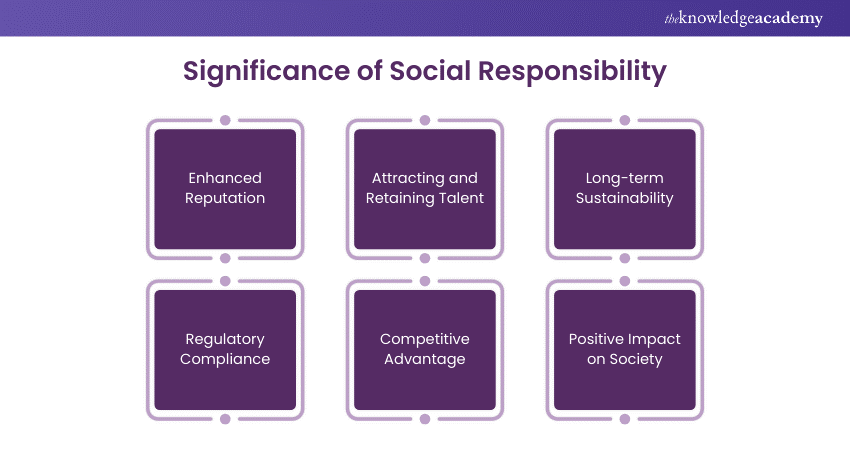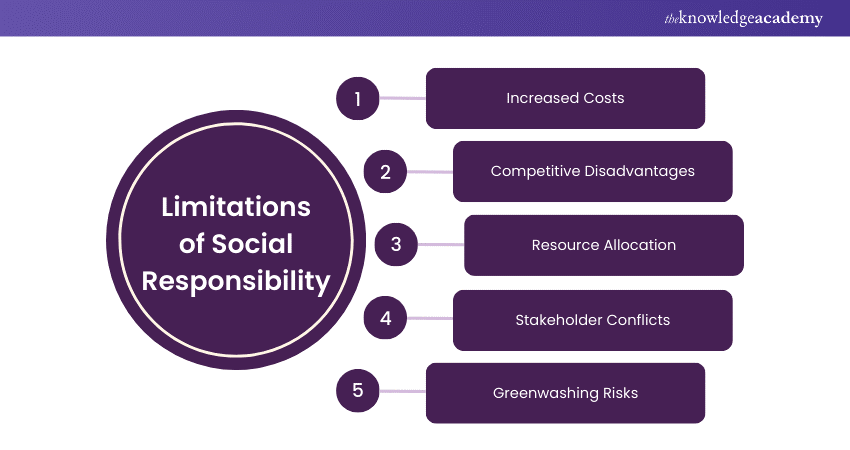We may not have the course you’re looking for. If you enquire or give us a call on + 800 908601 and speak to our training experts, we may still be able to help with your training requirements.
We ensure quality, budget-alignment, and timely delivery by our expert instructors.

Have you ever wondered why some companies go beyond their profit motives to make a positive impact on society? You've probably seen a clothing brand that produces stylish apparel and also ensures that every piece is made from ethically sourced materials and fair labour practices. This is a shining example of Social Responsibility in action.
In this blog, we will explore the definition of Social Responsibility, delve into its various forms, and highlight examples of corporations that have successfully integrated it into their core operations. Dive in to uncover the significance and its impact in the present times.
Table of Contents
1) What is Social Responsibility?
2) Importance of Social Responsibility
3) Types of Social Responsibility
4) Examples of Social Responsibility
5) Drawbacks of Social Responsibility
6) Conclusion
What is Social Responsibility?
Social Responsibility highlights the moral duty of people and agencies to have interaction in practices that advantage society. This concept has come to be increasingly big among traders and purchasers who favour to guide groups that actively make a contribution to societal and environmental well-being.
Although critics have often argued that traditional commercial enterprise models do no longer keep in mind society as a stakeholder, a developing quantity of buyers and clients are actually advocating for Social Responsibility and using change.
Importance of Social Responsibility
Embracing Social Responsibility is essential for businesses aiming to make a positive impact on society and the environment. Here are some detailed reasons why Social Responsibility is important:

a) Companies that actively engage in Social Responsibility tasks regularly enjoy a better recognition among purchasers, traders, and the overall public. This fantastic photograph can cause increased patron loyalty and accept as true with.
b) Employees are more likely to be drawn to and stay with agencies that exhibit a dedication to social and environmental reasons. This can result in higher worker pleasure and reduced turnover prices.
c) By adopting sustainable practices, businesses can ensure their long-term viability. This includes lowering environmental effect, maintaining assets, and fostering a more fit planet for future generations.
d) Engaging in socially responsible practices can help companies live ahead of regulations and avoid criminal troubles. This proactive approach can shop businesses from ability fines and sanctions.
e) Companies that prioritise Social Responsibility can differentiate themselves from competitors. This may be an extensive gain in markets in which clients are increasing in number of making purchasing decisions primarily based on an enterprise’s moral and environmental practices.
f) Ultimately, Social Responsibility lets in agencies to make a contribution undoubtedly to society. This can include assisting nearby groups, improving public health, and addressing social problems consisting of poverty and inequality.
Empower yourself by joining our Personal Development Courses now - book your spot now!
Types of Social Responsibility
While Social Responsibility offers numerous advantages, it also presents several challenges for businesses. Understanding the different types of Social Responsibility can help companies navigate these complexities. Here are a few key factors to consider:
1) Environmental Responsibility
This type of responsibility pertains to an organisation’s commitment to conducting its business in an environmentally friendly manner. Companies with this aim typically focus on three key actions:
a) Reduction: Companies can enforce approaches and projects to minimise their poor effect on the environment. This can consist of addressing commonplace dangerous byproducts of commercial enterprise including pollution, plastic waste, and water contamination.
b) Sustainability: Companies can also utilise greater renewable assets in their each day operations, together with switching to renewable energy, the use of sustainable resources like digital communications, and employing recycled substances like paper and plastic.
c) Neutrality: Some organisations are creating pioneering environmental companies with the simplest promise of reducing their own waste; in addition to incorporating initiatives to neutralise existing disastrous consequences. Examples of such work include planting trees, donating to research aimed at removing carbon from the environment, and funding charitable projects.
2) Ethical Responsibility
Ethical responsibility refers to an organisation’s commitment to operating in a fair and ethical manner towards its employees, customers, and the surrounding community:
Ethical obligation refers to an agency’s dedication to running in an honest and ethical manner toward its employees, clients, and the surrounding community:
a) Employees: A business can reveal its willpower to ethical duty through treating its personnel with admire and valuing their contributions. This consists of providing a safe working environment and rewarding wages.
b) Customers: Upholding an enterprise’s moral responsibility to its clients involves supplying products which might be authentic to their promotional claims, pleasures the guarantees made through the seller, and ensuring the products aren't harmful. It also consists of maintaining a truthful customer support policy that assists clients effectively.
c) Community: A business enterprise has an ethical obligation to its community, meaning its products ought to not negatively impact the lives or surroundings of the individuals involved with the organisation or its surrounding community. This may additionally involve sourcing substances from ethical places to keep away from endangering local groups, along with the guidance of merchandise attributable to slavery or infant labour.
3) Legal Responsibility
This concept pertains to a business’s responsibility to uphold and comply with the laws of the society in which it operates. Laws represent an agreement among a group of people and the rules that govern them. Businesses are obligated to adhere to these rules at every level of law and government to ensure the safety and protection of themselves and the community. There are three aspects of a company’s legal responsibility:
a) Regulations: Government regulations are established to protect customers and the economy. A business has a duty to comply with these regulations, regardless of their impact on profitability.
b) Taxes: It is a company’s obligation to pay taxes to ensure the continuation of government-provided services that offer protection and support. Without corporate taxes, many services that enhance business capabilities would not exist.
c) Criminal Law: A company and its managers are accountable for adhering to the same legal standards as private individuals. This means they must not endanger lives, steal property, or engage in any illegal activities.
Boost your productivity by signing up for our expert-led Time Management Training now!
4) Philanthropic Responsibility
This idea relates to a business’s commitment to keep away from causing damage; however it also refers to actively work toward enhancing the arena. Businesses make philanthropic contributions from their income and allocate them to consider one of the three sorts of corporations:
a) External Philanthropic Organisation Related to Their Stated Mission: Some businesses pick out charities or organisations that help precise causes aligned with the employer’s basic undertaking. For instance, an enterprise that produces school resources may donate income to build faculties in underprivileged regions.
b) External Philanthropic Organisation Unrelated to Their Stated Mission: Businesses aren't required to make these unrelated donations regularly, although an established sample of giving can be an amazing advertising and marketing method. For instance, a tech enterprise may donate to a company that provides food to the hungry and use their common donations as a point of marketing to demonstrate their Social Responsibility.
c) Internal Philanthropic Organisation: Some corporations have created their very own businesses to manipulate contributions to causes related to the organisation’s philanthropic undertaking. Sometimes these projects are an imperative part of the commercial enterprise version, consisting of purchase-one-deliver-one strategies.
Examples of Social Responsibility
Many companies have successfully integrated Social Responsibility into their core operations, setting examples for others to follow. Here are a few notable examples:
a) Starbucks: Starbucks Corp. (SBUX) has been committed to Corporate Social Responsibility (CSR) from the outset, focusing on sustainability and community welfare. It purchases Fair Trade Certified ingredients for its products and actively supports sustainable farming in the regions where these ingredients are sourced.
b) Ben & Jerry’s Homemade Holdings Inc.: Ben & Jerry’s Homemade Holdings Inc. has integrated CSR into the core of its operations. Similar to Starbucks, the company purchases Fair Trade Certified ingredients.
c) Salesforce: Salesforce.com Inc. has developed what it calls the “1-1-1 model,” dedicating 1% of its equity, 1% of its product, and 1% of its employees’ time to community initiatives.
d) Big-box Retailer: Big-box Retailer Target Corp. (TGT) is also renowned for its Social Responsibility plans. It has donated money to the communities where its stores operate, including providing education grants. Target has also introduced an initiative offering debt-free degrees to more than 340,000 of its team members.
Drawbacks of Social Responsibility
Just as there are many advantages to Social Responsibility, there are also several disadvantages for businesses. A few factors include:

a) Implementing socially responsible practices can be expensive, potentially reducing profits.
b) Companies that do not engage in Social Responsibility may have lower costs and can offer lower prices.
c) Resources spent on Social Responsibility initiatives might be diverted from core business activities.
d) Balancing the interests of multiple stakeholders can be challenging and may lead to conflicts.
e) Companies might engage in superficial Social Responsibility efforts to enhance their reputation without making meaningful changes.
Conclusion
In conclusion, Social Responsibility is more than just a corporate trend—it’s a vital practice that benefits businesses, and communities. By embracing this, companies can build trust, foster loyalty, and contribute to a sustainable future. This commitment enhances corporate reputation and drives long-term success and positive societal change.
Build stronger connections by signing up for our Emotional Intelligence Training today!
Frequently Asked Questions
How can Consumers Support Socially Responsible Businesses?

Consumers can support Socially Responsible Investment by purchasing products from socially responsible businesses, promoting them through word of mouth, and engaging with them on social media. Additionally, they can choose companies with ethical practices, such as fair trade or environmental sustainability.
Is Social Responsibility Only Relevant for Large Corporations?

Social Responsibility isn't limited to large corporations; small and medium-sized businesses can also adopt ethical policies, support local communities, and lessen their environmental impact, making it relevant across all business sizes.
What are the Other Resources and Offers Provided by The Knowledge Academy?

The Knowledge Academy takes global learning to new heights, offering over 3,000 online courses across 490+ locations in 190+ countries. This expansive reach ensures accessibility and convenience for learners worldwide.
Alongside our diverse Online Course Catalogue, encompassing 19 major categories, we go the extra mile by providing a plethora of free educational Online Resources like News updates, Blogs, videos, webinars, and interview questions. Tailoring learning experiences further, professionals can maximise value with customisable Course Bundles of TKA.
What is The Knowledge Pass, and How Does it Work?

The Knowledge Academy’s Knowledge Pass, a prepaid voucher, adds another layer of flexibility, allowing course bookings over a 12-month period. Join us on a journey where education knows no bounds.
What are the Related Courses and Blogs Provided by The Knowledge Academy?

The Knowledge Academy offers various Personal Development Courses, including the Time Management Training, Journalism Course, and Social Responsibility Course. These courses cater to different skill levels, providing comprehensive insights into Facility Management Trends.
Our Business Skills Blogs cover a range of topics related to Social Responsibility, offering valuable resources, best practices, and industry insights. Whether you are a beginner or looking to advance your Business skills, The Knowledge Academy's diverse courses and informative blogs have got you covered.
Upcoming Business Skills Resources Batches & Dates
Date
 Social Responsibility Course
Social Responsibility Course
Fri 21st Mar 2025
Fri 2nd May 2025
Fri 27th Jun 2025
Fri 29th Aug 2025
Fri 3rd Oct 2025
Fri 5th Dec 2025






 Top Rated Course
Top Rated Course



 If you wish to make any changes to your course, please
If you wish to make any changes to your course, please


